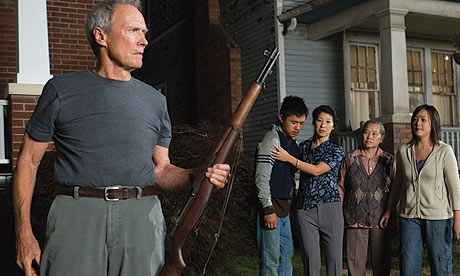
There is a reason Gran Torino hit cinemas here on Friday, just a couple of days before the Oscars. This hearty tale of a racist curmudgeon who finds redemption through friendship with a young immigrant neighbour was originally timed to take advantage of what producers expected to be considerable awards season clout. With Academy favourite Clint Eastwood taking both actor and director roles, producers must have doubted Oscars voters' ability to resist honouring the star of Dirty Harry and The Good, the Bad and the Ugly for his skills in front of the camera one last time.
In the end, Eastwood's swansong, for it is supposedly his final film as an actor, had to be content with beating out its rivals at the US box office. The film's $129m is ahead of the $122m taken so far by The Curious Case of Benjamin Button, which won three Oscars last night, and dwarfs the $88m swindled by Slumdog Millionaire, which won eight.
And yet Gran Torino is an extremely well-reviewed film. The critics love Eastwood's turn as mean old Walt Kowalski, the Korean war vet who finds himself the last white man standing in a neighbourhood overrun by Hmongs, people who look, to him, like the "gooks" and "chinks" he fought against in the 50s, but who in fact arrived in America as refugees from persecution in Vietnam and Laos over their support for the US in the Vietnam war.
The film's main relationship is that of Kowalski and 15-year-old Thao Vang Lor. They meet at opposite ends of a rifle barrel after the shy teenager tries to purloin his neighbour's prize Ford as part of an initiation ceremony into a local gang, before evolving into one of cinema's most bizarre odd couples: the uncomfortable-in-his-skin adolescent and the looming, granite-hard old codger determined to show him how to be a real American man. It's a relationship ripe for comedy, and makes for a warm-hearted film which always avoids slipping into facile melodrama.
"In lesser hands this plot could have a tritely familiar air," writes Empire's Angie Errigo. "It could very easily have dwindled into crude comedy or descended into an obvious sentimentality. But Eastwood the actor grabs you with his first growl and has you between his clenched teeth for the duration. His direction is lean, clean and spare, with no fat and no sagging. It's an extraordinary piece of work to have done back-to-back with Changeling — obviously smaller in budget and cast, much simpler in design, confined to a handful of settings, but just as meticulously, astutely executed."
"Among actors of Eastwood's generation, James Garner might have been able to play this role, but my guess is, he'd be too nice in it," writes the Chicago Sun-Times' Roger Ebert. "Eastwood doesn't play nice. Walt makes no apologies for who he is, and that's why, when he begins to decide he likes his neighbors better than his own family, it means something. Gran Torino isn't a liberal parable. It's more like, out of the frying pan and into the melting pot."
"This is still an enjoyably big, brash, macho melodrama, saved from absurdity by Eastwood's cracking performance," writes our own Peter Bradshaw. "It isn't his late masterpiece: I think his Iwo Jima movies fit that bill better. But it is almost certainly Clint Eastwood's final acting appearance: a must-see on that account if nothing else."
It's not hard to find the odd disputant, however. While admitting that Eastwood "gets more compelling the older he gets," Sukhdev Sandhu in the Telegraph says audiences will "wish that the film could have lost 30 minutes, depicted immigrant gangs with a jot of subtlety, and reined in the onerous symbolism at its close that leaves us empty and unsatisfied".
For me, Gran Torino works perfectly as an elegiac final roll of the dice for Eastwood, who, like John Wayne before him, always managed to be a great screen presence without ever convincing you he was a great actor. This is his own The Shootist, but the post-credits song, crooned by the actor himself in a gravelly croak, reminded me of another great 20th century artist's last hurrah: Johnny Cash's cover of Nine Inch Nails' Hurt. And yet that recording, made not long before Cash quit this mortal coil, always sounded like the singer was on his last legs. Eastwood, in contrast, goes out with, literally, a blast, looking as much like the wrong guy to mess with as he ever did.
But perhaps you disagree. What were your thoughts on Gran Torino, if you caught it at the weekend? Was Eastwood's final flourish worth stepping out for? And why do you think it barely registered with Academy Awards voters?







